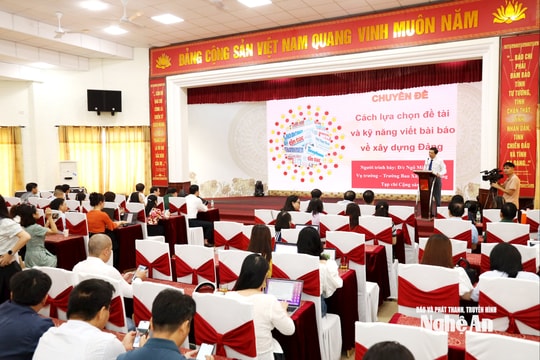Newspapers are not dying but are evolving on digital platforms.
In the era of digital revolution, traditional journalism has declined, as evidenced by the closure of a series of print newspapers, especially in the West.
Media consultant Edward Parker in his article “The Changing Face of Indonesian Media” in the recent issue of Jakarta Global newspaper has given a more thorough analysis of both the challenges and opportunities for the media in the digital age.
The author notes that it has become almost cliché in recent years to lament the decline of traditional journalism, with many print newspapers closing down and describing its ominous effects.
 |
| Illustration photo. (Source: oevblog.de) |
The common refrain is that this signals the end of feature stories, in-depth articles, quality investigative reporting, and the beginning of a new era of speed and content decline.
An evolution is taking place, journalism is not dead but is being reborn on different platforms and mediums in the new world of online, social and interactive digital media. What is going on is the democratization of media.
The end of an era in which power and influence were concentrated in the hands of a few publications, journalists and prominent commentators who monopolized “news” and the interpretation of events.
The end of a world of limited voices, few opposing views and limited space to move to a world of multiple perspectives. This is true everywhere, but to a greater extent in Indonesia.
Today, Indonesia has press freedom with hundreds of different media outlets at both local and national levels.
The digital world has democratized the media environment, reducing the influence of media controlled by powerful executives who decide not only what you will read but also what you will think through their analysis of events. Information, good or bad, is easily and instantly accessible, regardless of geographic distance or knowledge base.
The internet is growing rapidly in Indonesia, and the popularity of smartphones allows users to bypass more expensive wired computer connections. From rural villages to city centers, access to information is being democratized. Lazy journalism certainly has no future.
The decline of traditional advertising has led to the inevitable demise of many print newspapers, but advertising has not disappeared, it has moved to new media. If what you write and the product you offer is of any value, people will be interested enough to “click” on that link, spend a lot of time exploring that website, and create an opportunity for media to make money.
A new media trend is that successful media products are focusing more in-depth. Previously, large media companies tried to appeal to all audiences by “embracing” all topics to attract as many customers as possible.
This is changing in part because trying to offer everything at once while also having the ambition to do everything better than everyone else is difficult. The rise of digital media has given readers more choice.
Media outlets that continue to thrive in the digital world have actually grown up, focusing their resources on one main area. They work hard to serve their readers, just as businesses focus on marketing their products. Media outlets are now forced to think harder about how to communicate complex information, stories, and data in a compelling way to readers.
The author concludes that while everything is changing, one constant remains. It is the decline of journalism and the media environment today that is creating more opportunities than ever for professional journalists.
Readers demand quality analysis, away from the same old, dull and dry narratives. They are looking for information and entertainment through new stories.
This is why we should not lament the demise of traditional journalism but embrace this new world with all the opportunities it creates./.
According to Vietnamplus
| RELATED NEWS |
|---|


.jpg)





